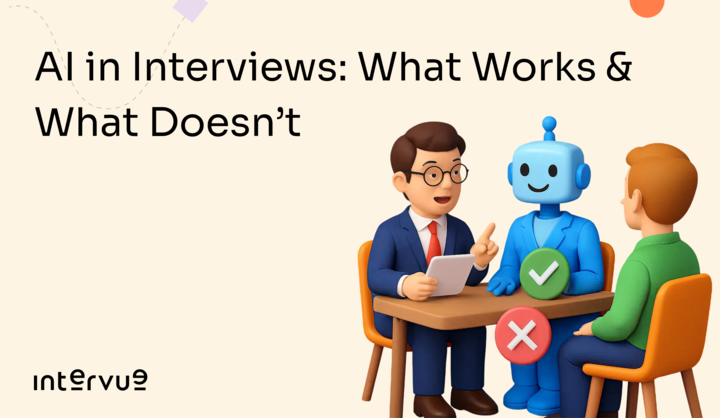Behind the Code: Essential Backend Developer Skills & Job Description
Backend developers play a crucial role in crafting, building, and sustaining the core elements – the server-side – of web applications.

Backend developers play a crucial role in crafting, building, and sustaining the core elements – the server-side – of web applications. Their focus lies in databases, servers, and application program interfaces (APIs) that operate behind the scenes, ensuring the seamless functionality of a website's client-side. Given the technical complexity of their role, backend developers require specialized skills.
This article aims to define these skills, offer examples, explore methods for skill enhancement, and provide insights on effectively showcasing them in the hiring process.
What Are Backend Developer Skills?
Backend developer skills encompass both technical expertise and soft skills essential for proficiently executing backend development responsibilities. Technical competence in server-side scripting languages, API utilization, and proficiency in database management tools is crucial. Additionally, soft skills such as effective communication, problem-solving acumen, and creativity play a pivotal role in establishing a thriving career in backend development.
Examples Of Backend Developer Skills
Here are some examples of backend developer skills:
Technical Skills
Programming and Server Languages:
Backend developers, responsible for the technology behind a web application's frontend, should possess proficiency in programming languages like Java, Python, .NET, PHP, or Ruby. While mastery in all isn't necessary, expertise in at least one is crucial for effective development.
Database Management:
Backend developers play a pivotal role in managing hosting environments, requiring in-depth knowledge of database administration and systems such as MySQL and MongoDB. They are responsible for data recovery, storage solutions, and handling large volumes of information within the application database.
Knowledge of API:
Understanding APIs (Application Programming Interfaces) is integral to backend development. Backend developers must adeptly write API codes, ensuring error-free communication between applications and servers. APIs facilitate data exchange, enabling the presentation of information in a readable format to users.
Knowledge of Middleware:
Middleware serves as a crucial component connecting the frontend and backend. Backend developers need a profound understanding of middleware, as it controls the flow of information between the database, operating system, application, and server. Proficiency in middleware enhances IT efficiency and streamlines business process management.
Soft Skills
Here are four important soft skills an employer looks for in a backend developer:
Communication Skills:
Effective communication is vital for backend developers, involving both excellent verbal skills for interaction with colleagues and stakeholders and mastery of written communication for code documentation and test case writing. Clear documentation facilitates collaboration and ensures project specifications are met.
Active Listening:
Attending meetings with clients and stakeholders is common for backend developers. Active listening skills are crucial in understanding project requirements, building connections with clients, gaining trust, and preventing the oversight of crucial information.
Problem-Solving:
Backend developers need strong problem-solving skills to efficiently handle tasks like coding, designing APIs, and troubleshooting. Detecting and resolving bugs, making code revisions without affecting functionality, and preventing unexpected crashes are integral aspects of their daily work.
Technical Creativity:
Technical creativity proves valuable for backend developers in designing website aesthetics and structuring code. Creativity is also essential when determining database structures to model complex project requirements. Writing clear and understandable code demonstrates creativity, facilitating collaboration with other developers and quality analysts.
How To Improve Backend Developer Skills
Here are four ways to improve your backend developer skills:
1. Practice Coding:
Devote time to coding practice in languages like Java, PHP, Python, or Ruby, depending on your job focus. Regular practice enhances your skills, making you a more experienced backend developer. Utilize free online platforms to sharpen your coding abilities.
2.Learn New Programming Languages:
Enroll in programming language courses to gain proficiency in unfamiliar languages. For example, if you're well-versed in PHP but lack experience in Python, take an online Python course. Learning new languages broadens your skill set, stepping out of your comfort zone and adding valuable expertise to your toolkit.
3. Learn Frontend Languages:
Expand your skill set by familiarizing yourself with frontend languages like CSS, HTML, and JavaScript. Backend developers, responsible for delivering data to frontend applications, benefit from understanding frontend languages. This knowledge facilitates effective communication and collaboration with frontend developers, aiding in problem-solving. Open-source websites offer resources for learning these frontend languages.
4. Read Books:
Elevate your career and skills by reading technical and self-help books. Technical books enhance your knowledge, while self-help books contribute to soft skill improvement. Reading provides unique perspectives, insights from others' experiences, and actionable knowledge applicable to your workplace.
Top 5 Skills for a Backend Developer in 2024
1. Backend Programming Languages:
Object-oriented (OOP):
Organizes code into reusable building blocks called classes and objects. Examples include Python, Java, and .NET.
Functional Programming:
Focuses on mathematical functions, minimizing shared data. Languages like Haskell, Clojure, and SQL fall into this category.
Specific Languages:
- PHP: Scripting language for dynamic websites, widely used for web forms and databases.
- Python: Versatile language with clear syntax, suitable for web frameworks and deploying machine learning on websites.
- Ruby on Rails: Uses Ruby language for rapid web app development, simplified by the Rails framework.
- Java: Popular, platform-independent, object-oriented language for various tasks, including database connections and networking.
- .NET: Framework supporting web app development using languages like C#, compatible with macOS, Windows, and Linux.
2. Knowledge of Databases:
Types of Databases:
- SQL: Organizes data in tables, linked in a significant way. Examples include MySQL and PostgreSQL.
- NoSQL: Does not require structuring data beforehand, works on JSON and XML. Examples include MongoDB and Cassandra.
3. Knowledge of APIs:
Facilitate software communication, enabling systems to talk to each other using HTTP methods like GET, POST, PUT, and DELETE. Backend developers create APIs to fetch user data, enhancing the overall user experience.
4. Knowledge of Servers:
Every web application operates on a remote PC known as a server, handling requests for web-based files like HTML, CSS, and Javascript. Servers, essential for delivering services, are rarely turned off. Examples include Apache, Nginx, IIS servers, and Microsoft IIS.
5. Knowledge of Front-End Technology:
While specializing in the backend, a grasp of frontend basics enhances your capabilities. Proficiency in HTML, CSS, and JavaScript is crucial. JavaScript, a foundational language, breathes life into web pages, enabling dynamic elements, while CSS adds style, and HTML provides the structural framework.
6. Knowledge of Back-End Frameworks:
Embrace backend frameworks to complement your chosen programming language. Frameworks streamline development, offering ready-to-use tools and libraries. Examples include:
- Ruby on Rails:
Revolutionize development with automated testing, libraries, and scaffolding. An open-source framework written in Ruby, ideal for seamless web apps. - Node.js:
An open-source platform for backend development, using JavaScript. Cross-platform and compatible with Windows, Linux, and macOS, it's known for speed and reliability. - Express.js:
Built on Node.js, it excels in speed and reliability, particularly for APIs. Ideal for crafting web and mobile applications. - Django:
An open-source Python framework known for minimal code requirements and rapid app development. - Flask:
A Python-based framework offering WSGI assistance and rapid templating for modern web applications.
7. Version Control System:
Version control systems are essential as code evolves. They track changes, enabling easy reversion to earlier versions and safeguarding source code.
- AWS Code Commit:
Amazon's secure version control system, ideal for managing source code and data. - GitHub:
A popular open-source community fostering global collaboration and contribution among developers. - GitLab:
Comprehensive platform facilitating collaboration and efficient software development through streamlined communication.
8. DSA (Data Structures and Algorithms):
A strong grasp of Data Structures and Algorithms is crucial for efficient data handling, retrieval, and memory management. These concepts optimize code and enhance backend capabilities.
9. Problem Solving:
Backend developers play a pivotal role as troubleshooters in the digital realm. Cultivating strong problem-solving skills is vital, ensuring the seamless operation of websites.
10. Communication Skills:
Despite the intense focus on development, proficient communication with teams, clients, and managers is vital for successful projects. Clear discussions and idea exchanges are essential for harmonious teamwork. Sharpen your communication skills to thrive in collaborative environments.
How To Highlight Backend Developer Skills
1. In your CV:
Skills Section:
Highlight backend developer skills with proficiency levels, incorporating keywords related to the job description.
Example:
- 4+ years of experience using version control and source code management tools
- Strong communication and problem-solving skills
- Expert knowledge of database technologies
- Excellent coding skills
Experience Section:
Integrate backend skills within your experience details, showcasing specific accomplishments and projects.
Example:
- Migrated API from ES version 1.9 to ES version 4.x
- Implemented algorithms and solved system-related problems
- Delivered projects using agile methodology
- Discussed project requirements with stakeholders to meet specifications
2.In your profile summary:
Craft a compelling profile summary using keywords and action verbs to highlight your backend expertise.
Example:
“Passionate and creative backend developer with five years of experience designing, building, and enhancing .Net web applications for EdTech companies. Proficient in SQL, APIs, and GraphQL.”
3. In your interview:
Demonstrate your qualities and experience during the interview. Be prepared to answer technical questions that showcase your problem-solving and backend developer skills. Use real-world examples to support your proficiency in various areas.
Back-end Developer Job Description
Backend developers are tasked with creating APIs, managing databases, crafting libraries, and enhancing data architecture. Additional responsibilities encompass collaborating with frontend developers to optimize data transfer, working closely with PM and QA engineers for an optimal UX, ensuring application speed under varying user traffic, liaising with stakeholders to translate needs into technical solutions, optimizing response time, analyzing requirements for efficient solutions, database interaction, developing and managing APIs, designing scalable system architecture, implementing security measures, and writing reusable code for future use.
Summing It Up
Backend developers form the backbone of web applications, excelling in both technical prowess and essential soft skills. Their expertise in programming languages, database management, APIs, and problem-solving is complemented by effective communication and creativity. To stay ahead, continuous skill improvement through coding practice, language learning, and embracing new technologies is crucial.
The top skills for 2024 include proficiency in backend programming languages, database and API knowledge, server expertise, understanding of front-end technology, familiarity with frameworks, version control systems, and strong data structures and algorithms understanding. Successfully highlighting these skills in CVs, profile summaries, and interviews ensures backend developers thrive in the evolving tech landscape.



